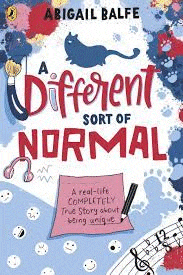
A Different Sort of Normal
A Different Sort of Normal
Abigail Balfe
Puffin, 2021
240pp., pbk., RRP $A19.99
9780241508794
It begins with a poem, the last stanza of which says,
This is for ANYONE
Who has ever felt out of place
You don’t have to be the “odd one out”
You’re unique and that’s just great.
It continues with a childhood memory of a Punch and Judy birthday treat that she hated and when she later asked her mum why, her mum said, “I wanted you to be a normal child. I didn’t want you to be an outcast like I was.”
The blurb says the rest…
Hi! My name is Abigail, and I’m autistic. But I didn’t know I was autistic until I was an adult-sort-of-person*.
This is my true story of growing up in the confusing ‘normal’ world, all the while missing some Very Important Information about myself.
There’ll be scary moments involving toilets and crowded trains, heart-warming tales of cats and pianos, and funny memories including my dad and a mysterious tub of ice cream. Along the way you’ll also find some Very Crucial Information about autism.
If you’ve ever felt different, out of place, like you don’t fit in . . . this book is for you.
While there are a lot of books that explore autism so others can have an insight, such as Annabel’s Dance; The Chalk Rainbow; and A Boy called BAT this is the first I’ve read that is written by someone on the spectrum for others on the spectrum. It maps her journey through childhood through a time when she didn’t know that there was a scientific reason for her difference, just all the while feeling confused, unwanted and left out.
It is a unique book, one for children and adults alike and made all the more poignant because of its honesty, truthfulness and lack of sugar-coating. The author explains her reasons for sharing her story and while she had to navigate the world alone because she did not have a diagnosis, to help others pave a different path she has produced a poster that helps us to be an ally to those we know.
Even though it is written directly to encourage children who are autistic to understand that while they ae unique, what they experience is not unique to them and they are not alone, it is one for anyone who has anything to do with children. Because if we don’t understand we can’t empathise.
